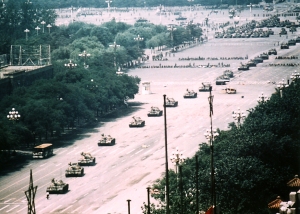
A few weeks ago Jack and I went to our local National Guard Unit to renew my ID. The young man who took my picture and laminated my card was back from his third tour in the middle east. He’s seen some stuff. Had that coma-cool, laid-back vibe going on that so often scabs over a throbbing layer of PTSD.
I admired the silver-framed picture of his beautiful wife and two adorable little daughters. Asked how he was doing adjusting to being back in the states.
“Good,” he said with a practiced smile. “Real good.”
“No trouble with being in traffic?” Jack asked.
“Ah, no sir. No trouble.” He stared off into the space just over our heads for a moment. “I leave home an hour so or early each day to avoid the rush. Stay on base a few hours after the day ends. You know, give them roads time to clear a little. Then, I’m good for the drive.” He met my eyes. “Most days I’m good for the drive.”
As I said, this young man had seen some stuff.
“You’re lucky,” I said. “Blessed, to have a good wife and those beautiful little girls.”
“Ah, huh. My wife she understands when I get the need for solitude, you know? Just need to come home and spend some time in the den getting my thoughts lined up. Mostly she understands. We been to classes at the VetCenter, her and me.”
I nodded. Kept my mouth shut.
“She knows I can’t do all that socializing she likes to do, you know? She’s good with taking the girls and going on her own. Used to it with me gone so much. My wife, she gets me. Don’t push for me to go with her to do the shopping in those crowded stores or to the parent/teacher deals at the school and such, you understand?”
“I do understand,” I said. “Jack’s a Vietnam vet. A Marine.”
“Ah, huh. I seen that when y’all walked in. He’s got the look.”
“You know that PTSD is a natural reaction to the trauma you’ve experienced, right?” I asked.
He met my eye, nodded. “I get by.”
This little exchange left both Jack and me with a good feeling. This young man wasn’t drowning his feelings in alcohol or repressing it with drugs. He was getting on with his life, doing his best to be there for his wife and daughters. He’d received some education on the symptoms of his PTSD and was using healthy tools to deal with his issues . He was, indeed, among the lucky and blessed.
I shared this experience, of meeting this grounded and solid young guardsman, with several friends. All had the same reaction. They were saddened, worried, upset by the limitations this man had on his enjoyment of life. I’ve been thinking about this reaction for the last few weeks.
I’ve concluded that while civilians have a working understanding of war, they mostly don’t understand the central fact of coming home from battle.
Going to war changes a person. Forever. There’s no going into battle, doing your duty, and coming home good as new. Not ever. Post-traumatic Stress is a natural reaction to trauma. The intensity and duration of the trauma determines the severity of the reaction. War is intense. War is every second of every day. Even when the battle is done. The potential for attack exists and therefore, the adrenaline pours into the brain and the body. The world grays and dims and changes. Forever.
This is a part of the true cost of war. Civilians understand this intellectually. Warriors know this truth with every cell of their bodies.

Every time I read your posts about men who’ve come home from war, I shed tears. I know that doesn’t help at all, but still it’s my reaction. Also to smile and shake their hand and say Thank You. I do know I’ll never understand.
It’s the trying to understand, the empathy that is important, I think. Maybe that’s why we write, eh? To do our best to BE another person, to live inside the experiences of another, even if it’s only for the length of time it takes us to write the book.
The traffic is a problem for soldiers coming back from war. Just having to walk through a VA hospital or BX filled with men is a nightmare for those of us with PTSD due to military sexual trauma. It is truly a gauntlet
Thank you for sharing this comment. You have my sincere respect and I am in awe for your daily bravery.
I had no idea that traffic triggered a military person’s PTSD. Wow. Your posts are so riveting. There seems to be more counseling for PTSD available now, more awareness and tools to help people cope with it and help for the families so that they understand their loved one better.
I think the military is doing a better job of debriefing now, they have more understanding of PTSD and they share the knowledge with soldiers. It’s still a bit of a catch-22 for a warrior to admit to PTSD, I think. It’s a career-ending diagnoses, even now.
Indeed, the true cost of war. . .